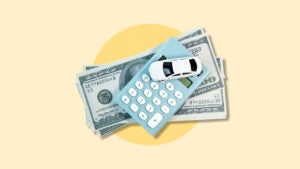Dealer fees: What to know and how to avoid them

Key takeaways
- Most dealership fees are negotiable, though there are a few you can’t avoid.
- If you’re interested in a service or product, there is likely a third party option that will cost less.
- Try not to wrap additional costs into your loan to save on interest.
Once you negotiate the price of your new car, you may be surprised to see a final sales number that is hundreds, perhaps thousands, of dollars higher than you originally negotiated. The bulk of these additional charges, or dealer fees, are required by law — such as tax, title and license fees. But some fees are completely up to the individual dealer and can be negotiated.
9 dealer fees you can avoid and negotiate
Not every fee a dealer throws your way is mandatory or non-negotiable. Be prepared to reject unnecessary options and haggle the fees on the products you want.
1. Vehicle preparation fee
Vehicle preparation fees are extra charges that the dealer adds to get the car ready for delivery. These include washing the car, removing the “bump protectors” from the doors and disposing of the protective coverings for the seats or floor. This can cost hundreds of extra dollars, so it’s worth being aware of.
Unless the dealer has done something above and beyond basic preparation, refuse to pay these dealer fees.
2. Dealer add-ons
Any dealer add-ons are paid for at the time of sale — but only if you requested them and determined that you are being charged a fair price. These might include a stolen vehicle recovery system, an anti-theft system, paint sealant or aftermarket sound systems.
These might include:
- Stolen vehicle recovery system.
- Anti-theft system.
- Paint sealant.
- Aftermarket sound systems.
- Window tinting.
- All-season floor mats.
- Splash guards.
- Nitrogen in tires.
- Pinstriping.
If a dealer tries to charge you for any of these items and you did not request them, refuse to pay the associated fee. If you did request them, shop around to ensure that you are getting a fair market price.
3. VIN etching
The VIN, or vehicle identification number, is a unique 17-character alphanumeric code that identifies your car. VIN etching engraves the number into your car’s windows to help identify your car if it is stolen.
The process can cost between $150 and $300, so it’s wise to avoid this additional cost and handle it on your own. You can get DIY kits starting around $10, and some local government agencies may even do it for free. This is one of the easiest fees to avoid, so be sure to be prepared to keep it from slipping through the paperwork cracks.
Say no to this additional fee and save money by going directly through a body shop for this service. You can even find a DIY kit online for around $20 to $40.
4. Extended warranty
An extended warranty is an additional fee that can cover potential car repairs once the manufacturer’s warranty expires. They aren’t necessary for every driver, especially because they can cost thousands of dollars a year. If you are worried about the price of possible vehicle repairs, it may be wise to rethink the vehicle you’re about to purchase. And if you decide an extended warranty is worth it, shop around instead of blindly going with the dealership’s offer.
Compare the cost of this fee with the probability that the warranty coverage will actually be used before signing off on it.
5. Gap insurance
Guaranteed asset protection, or gap insurance, covers the difference between the value of the car and the amount left on your loan if it is totaled or stolen. For example, if you still have $20,000 left on your car loan but your car is only worth $15,000, gap insurance covers the $5,000 difference. Gap insurance is typically cheaper than vehicle insurance, costing about $100 per year. It can also be applied for at any time, not just at the dealership, so you should shop for the best value instead of going with a dealer offer.
Have a down payment of at least 20 percent to make it unlikely for you to become upside-down on your loan — which will help you avoid needing to make up the difference in a worst-case scenario.
6. Advertising fee
An advertising fee covers the cost that dealers sometimes push based on the expense of running regional or national ads. The cost can add up — as much as $300 to $400, or more per purchase, in some cases.
If you see this cost, push back. This is the dealership’s cost of doing business, and you shouldn’t be responsible for it.
7. Protection products
Vehicle protection products, sometimes referred to as VPPs, provide protection against damage that could occur. These may be specific to the windshield, paint and finish or tires. If you want additional protection, it will likely be less expensive to purchase from an outside vendor after you leave the dealership.
If your dealership rolls protection product costs into your purchase, decline them. Even if there is a product you’d like to include, you can purchase it aftermarket at a potentially much lower cost.
8. Loan protection insurance
If you’re a worst-case scenario thinker, loan protection insurance may be an appealing concept. This type of insurance covers you in the event of job loss, death or other event that inhibits your ability to pay your auto loan. Loan protection insurance will keep you in your vehicle, but it won’t protect against other financial hardships that may arise.
In the event of a debilitating accident or untimely death, your loved ones will face other expenses that may be better addressed by a disability, accident, or life insurance policy.
9. Market adjustment
A market adjustment fee is often added to vehicle prices when supply is low and demand is high for a specific vehicle. This fee is added on top of the vehicle’s manufacturer-set MSRP. There are no laws or industry standards for setting a market adjustment fee since it is based on economic data and other factors, so this is a fee to avoid if possible.
Shop multiple dealerships if your vehicle of choice is in short supply. You’ll likely find one that is willing to waive the market adjustment fee in exchange for a sure sale.
Unavoidable dealer fees
There are dealer fees — and normal vehicle costs — you won’t be able to avoid, but you can prepare for them.
Tax, title and license fees
Title and license fees cover the expenses of transferring the title and getting the license plate. To learn the process and costs in your state, visit your state’s Department of Motor Vehicles (DMV) website. The price tag attached to the tax fee will depend on your state’s sales tax rate and cannot be negotiated. If you can, avoid including this fee in the amount you borrow. When you wrap these costs into your loan, you pay extra interest that you could otherwise avoid.
Documentation fee
The documentation fee covers the cost of processing the paperwork associated with a new car purchase and is something you will need to pay. Some states charge a flat fee for this item, typically well under $100. Other states have no specific requirements, so a dealer can charge whatever it wants. What you pay will vary based on your state and the dealer you work with. To get an idea of what’s standard, research local laws.
Destination fee
A destination fee covers the cost that it takes for the dealership to transport the car from the factory. It can’t be negotiated and will be a hefty part of your bill. Kelley Blue Book notes that these fees can run upwards of $1,700. According to Edmunds, picking up your vehicle at the factory won’t save you the destination charge — you’ll likely still have to pay the full amount.
Bottom line
Although some additional dealership fees are unavoidable, knowing which can be negotiated or removed altogether is the key to saving money when it comes to your next car-buying experience. Before you enter a showroom, calculate what car you can truly afford. You may also want to compare auto loan rates to avoid dealer markup — another common way dealerships try to upcharge you when buying a car.
Why we ask for feedback Your feedback helps us improve our content and services. It takes less than a minute to complete.
Your responses are anonymous and will only be used for improving our website.







